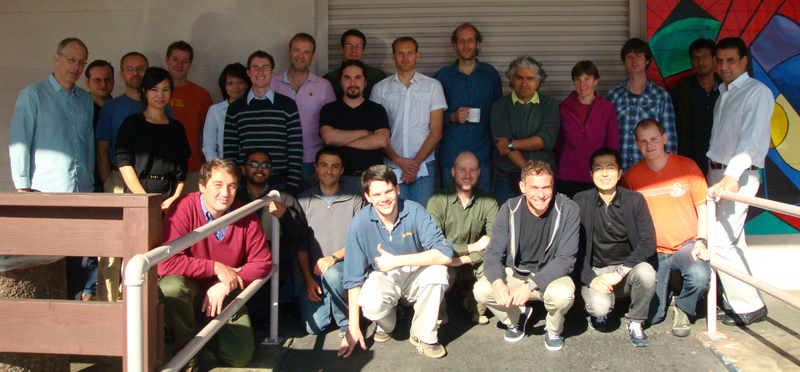The Kardar-Parisi-Zhang equation and universality class
October 24 to October 28, 2011
at the
American Institute of Mathematics,
San Jose, California
organized by
Ivan Corwin and Jeremy Quastel
Original Announcement
This workshop will be devoted to
the study of the the Kardar-Parisi-Zhang equation and universality class.
Brownian motion is a continuum scaling limit for a wide class of random
processes, and there has been great success in developing a theory for its
continuum properties (such as distribution functions) and expanding the
breadth of its universality class. Recently, a new universality class has
emerged to describe a host of important physical and probabilistic models
(such as one dimensional interface growth processes, interacting particle
systems and polymers in random environments) which display unusual
scalings and new statistics. This class is called the Kardar-Parisi-Zhang
(KPZ) universality class and underlying it is, again, a continuum object
-- now a non-linear stochastic partial differential equation -- which is
known as the KPZ equation.
The purpose of this workshop is to build on recent successes in
understanding the KPZ equation and its universality class. There are two
main focuses:
- Studying the integrability properties and statistics of the KPZ
equation. Surprisingly, it is possible to give exact formulas for certain
statistics associated with this non-linear stochastic PDE -- such as its
one-point distribution. We seek to understand the extend to which one can
perform
exact calculations using the rigorous Bethe Ansatz approach of
Tracy-Widom; the non-rigorous replica methods; or the tropical
Robinson-Schensted-Knuth correspondence. We also seek to elucidate the
poorly understood connection with random matrices.
- Extending the universality of the KPZ equation. Though it recognized
physically as universal, the KPZ equation has only been shown to
rigorously occur as the scaling limit of a few special models, for
example, weakly asymmetric simple exclusion processes, and weakly rescaled
polymers. In large part this is due to the fact that the KPZ equation is
not well-posed, and is presently only defined through the Hopf-Cole
transform of the well-posed multiplicative stochastic heat equation. A
good well-posedness theory should provide a route to proving scaling
limits to the KPZ equation for a wider class of models.
Material from the workshop
A list of participants.
The workshop schedule.
A report on the workshop activities.
Papers arising from the workshop:
Macdonald processes
by Alexei Borodin and Ivan Corwin
Stationary correlations for the 1D KPZ equation
by Takashi Imamura and Tomohiro Sasamoto,
J. Stat. Phys. 150 (2013), no. 5, 908-939 MR3028391From duality to determinants for q-TASEP and ASEP
by Alexei Borodin, Ivan Corwin, and Tomohiro Sasamoto,
Ann. Probab. 42 (2014), no. 6, 2314-2382 MR3265169Free energy fluctuations for directed polymers in random media in 1+1 dimension
by Alexei Borodin, Ivan Corwin, and Patrik Ferrari,
Comm. Pure Appl. Math. 67 (2014), no. 7, 1129-1214 MR3207195

